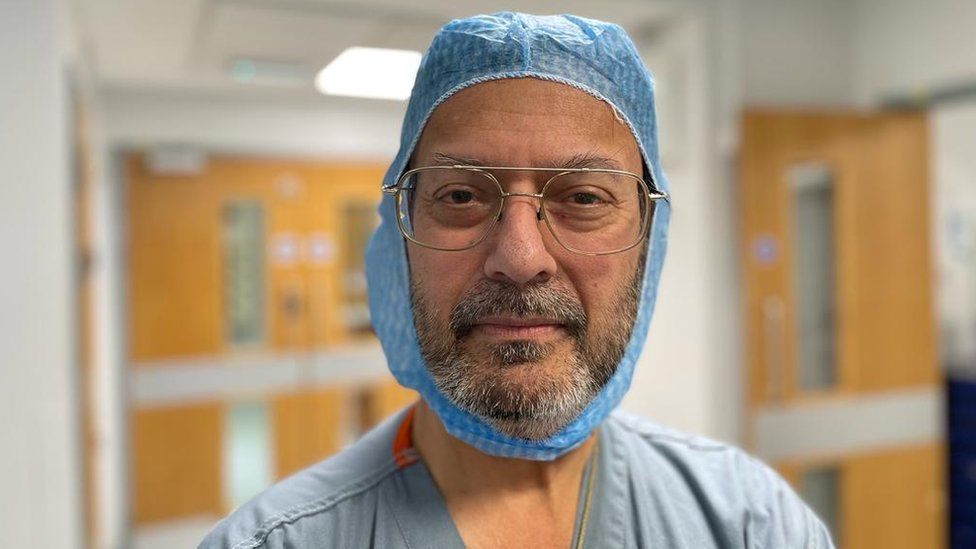ARTICLE AD BOX

Consultant orthopaedic surgeon Keshav Singhal aims to have his patients sent home on the same day
By Jenny Rees
BBC Wales health correspondent
Changes to hip and knee surgery could halve waiting lists at one hospital within a year, say doctors.
Tweaks to surgeries at the Princess of Wales hospital in Bridgend have allowed more patients to be sent home on the same day.
Therefore, a shortage of hospital beds is not a barrier for them.
It comes as over 37,000 orthopaedic patients are waiting over one year for surgery in Wales.
Consultant orthopaedic surgeon, Keshav Singhal, said a number of "minor tweaks" were made to the procedure "but all of them add up to a huge effect".
He said the anaesthetic and pain medication given to patients is "fine-tuned" to reduce pain and nausea after the operation and extra time is spent pinpointing any potential area of bleeding and cauterising it to "prevent wound leakage".
"In day surgery we are not constrained by beds - there are no beds here," said Mr Singhal.
"Patients can come in, be very well cared for in a state of the art day-surgery unit, and go home in the evening, and that totally cuts down on the inpatient beds."
Former pub owner, Cheron White, 68, recently benefitted from the new system for eligible patients in the Cwm Taf Morgannwg health board.
"It frees up beds for people who really need it," said the mother of five from Porthcawl.
"This is an operation, I'm not ill. Why stay in hospital if I'm not ill?"
Cheron White wants to be more mobile following her operation
Following her surgery, Ms White said: "I want to be as mobile as possible, to thank the hospital in a way - they've given me this opportunity to be mobile.
"It was awful just sitting there, getting older and not being able to do things - it was making me feel older, but in my head I'm not an old person."
The lack of capacity in hospitals has been the catalyst for innovation in orthopaedic surgery, according to Mr Singhal.
Traditionally people might have required several days in hospital after a joint replacement, but fewer beds are currently available across Wales because around 1,000 people every month can't be discharged because of the lack of social care.
The numbers waiting more than a year for trauma and orthopaedic surgery in Wales currently stands at 37,396, with over a third of those waiting longer than two years.
Mr Singhal explained day surgery is only suitable for patients who are relatively fit, motivated to do the rehabilitation exercises, and with family support.
Cheron White was one of the eligible patients in the Cwm Taf Morgannwg health board
He explained that patient reassurance and awareness of what will happen is key.
"The patients are worried - if I move around too quickly am I going to do any damage to my joint? If I move would I cause myself more pain?
"Once we reassure them on those two counts and make sure the pain is controlled, their motivation kicks in.
"They know the quicker they move, the less chance of deep vein thrombosis, or wound stiffness and a quicker recovery."
While day-surgery joint replacements aren't unusual, the tweaks made have meant the hospital has been able to formalise this alternative route for some patients.
This then frees up capacity on other surgical lists for those with more complex needs, who will require a bed on a ward.
"Absolutely the catalyst was the absence of inpatient beds," said Mr Singhal.
"Because of Covid we had a whole restructuring of services, so we had to make sure that we are still able to carry on these operations without beds. This was the ideal pathway.
"We hope that if we were to adopt this practice across the board, we would probably massively dent the current waiting times in Wales and indeed across the UK."
Anaesthetist Dr Gareth Parry is also part of the new system, and said the changes they've introduced have improved things for patients.
Dr Gareth Parry said people were feeling sick after surgery
"The most noticeable thing was almost 20% of people were feeling quite sick after surgery and that went down to being something that was quite uncommon," he said.
In November there were 748,271 patient pathways awaiting treatment in Wales, which is estimated to be around 586,000 individual patients, as some patients will be on more than one "pathway" to treatment.
Mr Singhal said day surgery for joint replacement has been done for a number of years in America and some hospitals in England have done it, but he believes they're the first to do it in an organised manner in Wales.

 2 years ago
57
2 years ago
57








 English (US) ·
English (US) ·